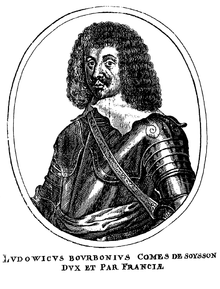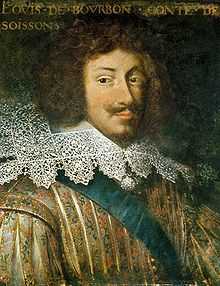Louis, Count of Soissons
| Louis de Bourbon | |
|---|---|
| Count of Soissons | |
 Engraving by Matthäus Merian | |
| Issue | Louis Henri, Count of Noyers |
| Father | Charles, Count of Soissons |
| Mother | Anne de Montafié |
| Born |
1 May 1604 Paris, France |
| Died |
6 July 1641 (aged 37) Battle of La Marfée, Sedan, Ardennes, France |
Louis de Bourbon (1 May 1604 – 6 July 1641) was Count of Soissons. He was the son of Charles de Bourbon, Count of Soissons and Anne de Montafié. He was the second cousin of King Louis XIII of France and a held the rank of prince of the blood
Biography
Around 1610, he and Marie de Bourbon, Duchess of Montpensier, were joined in contractual marriage assented to by the Regent of France, the Queen Mother Marie de' Medici. His sister was Louise de Bourbon, future Duchess of Longueville.
Born in Paris, he was made governor of the Dauphiné province (1612), an office inherited at the death of his father, and later governor of the Champagne province (1631). Around 1612, he was made the Grand Master of France, the head of the royal household.

He set up a conspiracy with his cousin Gaston d'Orléans (future husband of the duchess of Montpensier and younger brother of Louis XIII) and the comte de Montrésor with the intention to murder Cardinal Richelieu and depose the King, but the plot failed (1636). The King's mother, Marie de' Medici, had tried as well on numerous occasions to remove the Cardinal as well as once trying to depose the King in favor of her younger son Gaston. For this she was placed under house arrest for the remainder of her life.
Taking refuge in Sedan with the Duke of Bouillon (prince of the independent principality of Sedan), he plotted again against Richelieu, and the duc de Bouillon obtained the military support of Spain.
A French royal army under Gaspard de Coligny, Marshal Châtillon was sent to Sedan, but Coligny was routed at the Battle of La Marfée outside of Sedan on 6 July 1641. Of the King's 11,000 force, 600 were killed, 5500 were taken prisoner, while the Count of Soissons' forces suffered nominal losses. This was due to the late slow arrival of the King's forces through muddy roads and the surprise cavalry attack from their flank from behind a hill. The Count of Soissons, however, was killed after the battle while his officers were surrounding him by one officer whose identity was never ascertained, paid by Cardinal Richelieu. According to some sources, the Count died by accident while lifting the visor of his helmet with a loaded pistol, shooting himself in the head.[1]
His son Jean de Bourbon was captured in Turin, Piedmont, Italy. Later, the King would pretend an unrelated boy (Louis Henri) was an illegitimate child but that boy was born in 1646, five years after the death of the Count of Soissons.
He was buried in the Soissons family tomb at the Chartreuse de Bourbon-lez-Gaillon in Gaillon, in the French province of Normandy. The county of Soissons was passed onto his only surviving sister Marie de Bourbon, Princess of Carignano and wife of Thomas Francis of Savoy, a famous general.
Issue
- Louis Henri de Bourbon,[2] bâtard de Soissons, Count of Noyers and of Dunois, Prince of Neuchâtel (August 1640 – 8 February 1703) illegitimate son of Louis and Élisabeth des Hayes.[2] Line continues in the Dukes of Luynes family. Married Angelique Cunegonde de Montmorency-Luxembourg, daughter of François Henri de Montmorency[2] and had issue;[2]
Ancestors
| Ancestors of Louis, Count of Soissons | |||||||||||||||||||||||||||||||||||||||||||||||||||||||||||||||||||||||||||||||||||||||||||||||||||||||||||||||||||||||||||||||||||||||||||||||||||||||||||||||||||||||||||||||||||||||||||||||||||||||||||||||||||||||||||||||||||||||||||||||||||||||||||||||||||||||||||||||||||||||||||||||||||||||||||||||||||||||||||||||||||||||||||||||||||||||||||||||||||||||||||||||||||||||||||||||||||||||||||||||||||||||||||||||||||||||||||||||||||||||||||||||||||||||||||||||||||||||||||||||||
|---|---|---|---|---|---|---|---|---|---|---|---|---|---|---|---|---|---|---|---|---|---|---|---|---|---|---|---|---|---|---|---|---|---|---|---|---|---|---|---|---|---|---|---|---|---|---|---|---|---|---|---|---|---|---|---|---|---|---|---|---|---|---|---|---|---|---|---|---|---|---|---|---|---|---|---|---|---|---|---|---|---|---|---|---|---|---|---|---|---|---|---|---|---|---|---|---|---|---|---|---|---|---|---|---|---|---|---|---|---|---|---|---|---|---|---|---|---|---|---|---|---|---|---|---|---|---|---|---|---|---|---|---|---|---|---|---|---|---|---|---|---|---|---|---|---|---|---|---|---|---|---|---|---|---|---|---|---|---|---|---|---|---|---|---|---|---|---|---|---|---|---|---|---|---|---|---|---|---|---|---|---|---|---|---|---|---|---|---|---|---|---|---|---|---|---|---|---|---|---|---|---|---|---|---|---|---|---|---|---|---|---|---|---|---|---|---|---|---|---|---|---|---|---|---|---|---|---|---|---|---|---|---|---|---|---|---|---|---|---|---|---|---|---|---|---|---|---|---|---|---|---|---|---|---|---|---|---|---|---|---|---|---|---|---|---|---|---|---|---|---|---|---|---|---|---|---|---|---|---|---|---|---|---|---|---|---|---|---|---|---|---|---|---|---|---|---|---|---|---|---|---|---|---|---|---|---|---|---|---|---|---|---|---|---|---|---|---|---|---|---|---|---|---|---|---|---|---|---|---|---|---|---|---|---|---|---|---|---|---|---|---|---|---|---|---|---|---|---|---|---|---|---|---|---|---|---|---|---|---|---|---|---|---|---|---|---|---|---|---|---|---|---|---|---|---|---|---|---|---|---|---|---|---|---|---|---|---|---|---|---|---|---|---|---|---|---|---|---|---|---|---|---|---|---|---|---|---|---|---|---|---|---|---|---|---|---|---|---|---|---|---|---|---|---|---|---|---|---|---|---|---|---|---|---|---|---|---|---|---|---|---|---|---|---|---|---|---|---|---|---|---|---|---|---|---|---|---|---|---|---|---|---|---|---|---|---|---|---|---|---|---|---|---|---|---|---|---|---|---|---|---|
| |||||||||||||||||||||||||||||||||||||||||||||||||||||||||||||||||||||||||||||||||||||||||||||||||||||||||||||||||||||||||||||||||||||||||||||||||||||||||||||||||||||||||||||||||||||||||||||||||||||||||||||||||||||||||||||||||||||||||||||||||||||||||||||||||||||||||||||||||||||||||||||||||||||||||||||||||||||||||||||||||||||||||||||||||||||||||||||||||||||||||||||||||||||||||||||||||||||||||||||||||||||||||||||||||||||||||||||||||||||||||||||||||||||||||||||||||||||||||||||||||
Titles, styles, honours and arms
Titles and styles
- 1 May 1604 – 6 July 1641 His Serene Highness the Count of Soissons
References
See also
| ||||||||||||||||||||||||||||||||||||||||||||||||||||||